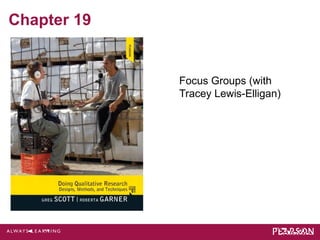More Related Content
Similar to Garner c19 (20)
More from Beulah Heights University (20)
Garner c19
- 2. The Many Uses Of An Unnatural
Venue: Focus Group Basics
• The “non-naturalness” of the focus group
venue should be:
– An advantage to the researcher
• One Exception: The In Situ Focus Group
• Gauging Appropriateness of the Method
– It has become a widely used method in
institutional research
© 2013 Pearson Education, Inc. All rights reserved.
- 3. The Many Uses Of An Unnatural
Venue: Focus Group Basics
– Group interaction among the participants
brings out themes and perspectives that a:
• Singleperson interview might not elicit
– The researcher can learn about topics and
opinions that the participants:
• Would not spontaneously bring up
© 2013 Pearson Education, Inc. All rights reserved.
- 4. Guidelines For Running A Focus
Group
• The first step in sampling
• Draw a sample that will yield about six to
eight people per focus group
• It is considered a good practice for focus
group participants not to know each other
© 2013 Pearson Education, Inc. All rights reserved.
- 5. Guidelines For Running A Focus
Group
• Pregroup questionnaire
– So participants understand their views on the
topics of the focus group
• A large size will make the data analysis
extremely difficult
• The researcher sets up a series of
questions in a document called a protocol
© 2013 Pearson Education, Inc. All rights reserved.
- 6. Guidelines For Running A Focus
Group
• The number of questions is usually
between 8 and 12
• The researcher needs to work closely with
an assistant called the moderator
• Focus group participants are human
subjects; regulations and norms
© 2013 Pearson Education, Inc. All rights reserved.
- 7. Guidelines For Running A Focus
Group
• Make sure that everyone has a chance to
address every question
– Make sure that interaction actually takes
place and flows freely
• Generally two hours would be a maximum
amount of time for a focus group;
– And one hour probably the minimum
© 2013 Pearson Education, Inc. All rights reserved.
- 8. Guidelines For Running A Focus
Group
• Recording what is happening
• Focus on a qualitative description of the
process you observed;
– And support your conclusions with quotations
from the transcript
• The method is only as good as the overall
conceptualization and research question
© 2013 Pearson Education, Inc. All rights reserved.
- 9. Research In Action: Examples Of
Focus Group-based Studies
• High School Focus Groups
– The focus groups should provide insights into
social processes, cultures, and behaviors
– The case study focus group analysis brought
together many sociological concepts
© 2013 Pearson Education, Inc. All rights reserved.
- 10. Research In Action: Examples Of
Focus Group-based Studies
• High School Focus Groups
– The focus groups should provide insights into
social processes, cultures, and behaviors
– The case study focus group analysis brought
together many sociological concepts
© 2013 Pearson Education, Inc. All rights reserved.
